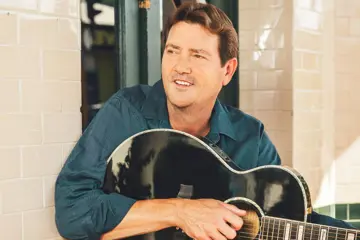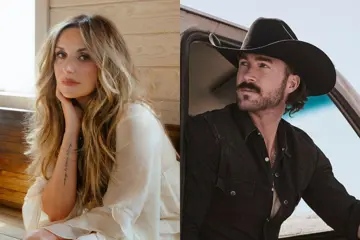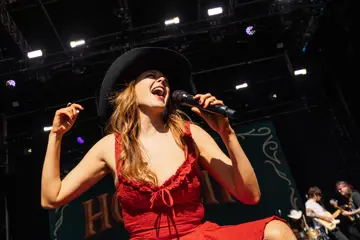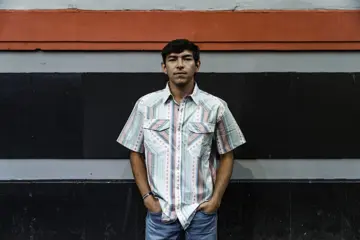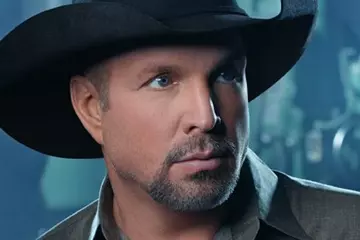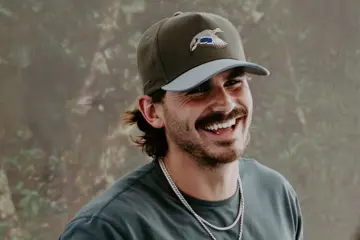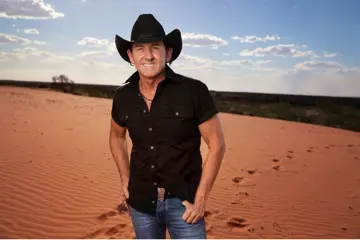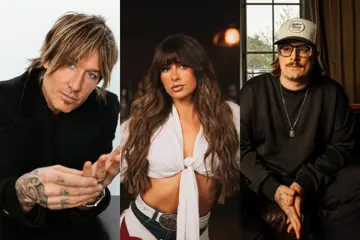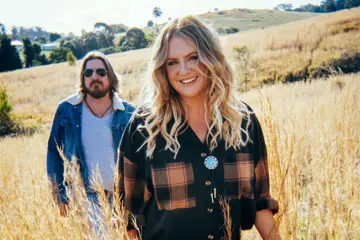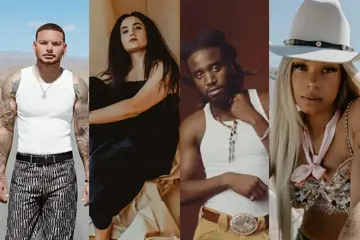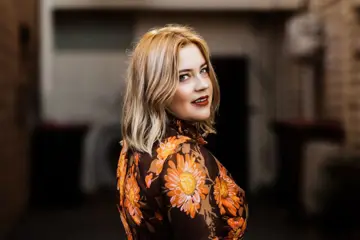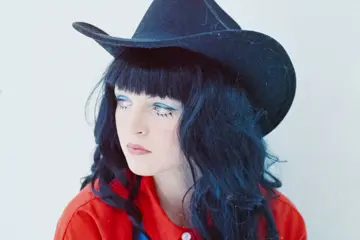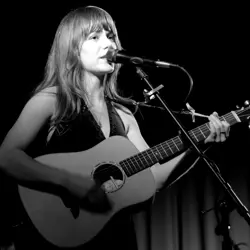 Jenny Lewis
Jenny Lewis“I think part of growing up a little bit is accepting everything for what it is, good or bad. It’s like, ‘Shit happens, how are you going to deal with that in your body and mind and soul?’”
Jenny Lewis is contemplating her brand new fifth solo album Joy’All, an upbeat collection of country-tinged indie-pop. It’s a lockdown album of sorts, not in the sense of wallowing in the misery of those dark times, but more about dusting oneself off at the other end, assessing the damage and vowing to make the best of future days.
The pursuit of joy became a central tenet of Lewis’ new post-COVID worldview, whether that’s the happiness inherent in her bond with two-year-old cockapoo puppy Bobby Rhubarb (A Puppy And A Truck), sharing some cool tunes and cold drinks with friends (Love Feel), or any of the other myriad ways one can court pleasure in the modern age.
Some of these methods, of course, concern affairs of the heart. There are a handful of ‘love gone wrong’ songs littered throughout Joy’All, but they’re far more than mere diary entries about relationships, rather part of a deeper, almost existential thread running through the album.
Join our community with our FREE weekly newsletter
“I feel like for me right now it’s the right batch of songs to be playing out in the world, emerging from years of solitude and worry and growth - all of the things,” she reflects. “I don’t think I could handle more than 30 minutes of pop music at this time, that’d be putting a hat on a hat, you know?”
“There’s a lot of Jungian stuff in there and Freudian stuff and quantum and physics, some Buddhist ideas in there and some Zen ideas, and some themes of cognitive dissonance throughout. So I think it just begs the question, ‘What are you going to do about it? What is going to be your response to your life?’
“Because all kinds of shit is going to happen, and you’re going to encounter all kinds of people - some of them aren’t going to be that nice to you - and you mightn’t be that nice all the time, so how are you going to weather it? The hope is that - despite all the hurdles - you’re going to find a joyful place in dealing with all the shit.
“I want to know the secret to existence and life - that’s what I’m getting at. Those are the deeper things that interest me, especially after the last couple of years when it all went to hell in a hand-basket.”
Lewis explains that one of her coping mechanisms during the lengthy lockdowns was participating in a week-long virtual songwriting workshop hosted by her friend and sometime-collaborator Beck, which not only helped Lewis break out of her creative comfort zone but also ended up informing a number of tracks on Joy’All.
“I think participating with your peers in a creative challenge after a long period of not hanging out was incredibly cathartic. A lot of it was in 2021, so it was the middle of COVID, and I had a lot of space to participate - whereas in the past, I would have chickened out because it’s a big task to come up with a song a day for seven days. I had to write, record and then figure out how to send it off - which is the hardest part,” she laughs.
“There’s so much to learn with songwriting, and I welcome any challenge. I tend to write in a way that’s very ‘channel-y’; there’s a feeling, and then there’s a magical process, but then there’s a stage of lots of homework afterwards where I chisel away at it.
“But this was really cool, and I discovered that you can write a song with all cliches like Love Feel, or you can write a song with a poem or text that already exists, or you can make an instrumental - I learned a lot, and it was really interesting."
With Lewis these days splitting her time between LA and her newly-adopted second home of Nashville, it was inevitable that a country lilt would come to colour songs such as Apples and Oranges, Giddy Up and the aforementioned Love Feel. Although she freely admits to being far from an expert in the field (yet).
"I grew up in California, so I learned about county music through either TV movies like The Patsy Cline Story or Five Easy Pieces - Stand By Your Man was in that film, or just randomly stumbling on artists like Buck Owens or Gram Parsons.
“So that’s how I absorbed country music initially, but then since I’ve been in Nashville, I’ve learned so much about classic country but also about ‘90s songwriters like Keith Whitley. There’s so much great music out there, and there’s so much to learn.
“Growing up in LA, Garth Brooks wasn’t on the radio, whereas he was on the radio the entire time in Nashville. We didn’t get access to that, so there are definitely some songs being played at the honky-tonks where I’m like, ‘What’s this song?’ and my friends are like, ‘This is a massive hit song from 1995!’ And I’m, like, ‘I’ve never heard this song!’
“It’s nice to know that there’s still stuff to be learned, and you don’t know everything about all music. I know a fair bit about different genres - I feel like I’m pretty well-versed - but there’s a lot more to learn.”
Lewis' newfound appreciation of country music even extends to the Joy’All artwork, which finds her resplendent in an outfit formerly owned by legendary singer-songwriter Skeeter Davis, who, fittingly, was a pioneer in crossing country music over to the pop realms in the ‘60s and ‘70s. Even the cover layout itself pays homage to a Davis album.
Sonically the country ties were augmented even further by the fact that it was recorded at Nashville's historic RCA Studio A with eight-time Grammy-winning producer Dave Cobb (John Prine, Brandi Carlile, Chris Stapleton, Jason Isbell) at the helm, cut largely live, with Cobb’s red-hot session band to bathe the songs in a warm, intimate glow.
"I really attribute the vibe to Dave Cobb,” the singer smiles. “He made time for me, we didn’t meet under the guise of ‘Hey, do you want to make the new Jenny Lewis record?’ we just crossed paths organically and got on really well, and by chance, he was totally available.
“It just worked out, whereas normally, I think you’d had to wait a year or two to make a record with Dave. But I was living here in Nashville and had the songs, so I was, like, ‘I’m free, I don’t have anything on, I’m just down the road, let me know!’
“I love Dave. he’s so good. He’s very in the moment, which I really enjoy - cutting stuff live - and he’s not just an Americana producer, but he’s a great producer, period.
“When I met him, he was making the Lucius record with Brandi Carlile - which is a dance record - so I didn’t go into the studio thinking, ‘I’m going to make an Americana record with Dave Cobb’ I just wanted to make a record and as it turns out I was so impressed with him.
“There’s a reason he’s unwrapping Grammys while you’re in the studio, like, ‘Another box of awards arrived, Dave, you’d better unwrap them!’”
Lewis explains that Cobb’s impact went far beyond just helping craft the overall sonic aesthetic of Joy’All, even extending to influencing the structures of the songs themselves.
“Oh, he’s very involved in the arrangements,” she continues. “My biggest struggle has been finding the correct key for my songs and transposing them - because I write in a pretty small chordal world or with a capo or something - so to have someone hear the song and know where it should sit in my range, Dave is great at that.
“And then he’s great at producorial stuff like what I imagine people like Phil Spector did, where you get into the meat of the song a little bit - that’s supposedly your job as a producer, but not all producers do that.
“Like in the indie rock world - depending on the producer, obviously - but back in the day, it was, like, ‘We have the songs, we have six-minute guitar interludes, and we’re going to get someone to record accurate versions of our live sound’.
“Then going to Omaha and working with Mike Mogis from Bright Eyes, it was that same approach but then adding horns and strings and all of these things we hadn’t had access to previously, which definitely opened new doors for us."
These past indie rock forays that Lewis is recounting hark back to her time fronting beloved ‘00s outfit Rilo Kiley, who became strongly aligned with Omaha’s fertile Saddle Creek community to the point that the singer was often found popping up in cameos on records by friends such as Cursive, Bright Eyes and The Good Life.
"Yeah, and we put out [2002 second album] The Execution Of All Things on Saddle Creek and toured with our friends from those bands pretty much exclusively,” she gushes. “It was a really, really amazing time, and those bands were so inspiring.
“And there were tons of women playing all of these instruments in those bands - Cursive had a female cellist, and when I first saw Conor [Oberst] doing Bright Eyes, he had an all-women band - so it felt like a really inclusive scene.”
Pleasingly, as someone with more than 20 years of experience at the rock’n’roll coalface, Lewis attests that the music community is gradually becoming more inclusive in a broader sense.
“Yes, for sure, look at festival line-ups - it’s incredible,” she enthuses. “We have a long way to go in terms of pay equality and things like that, but it really does feel like progress has been made.
“I think the older I get, the less competitive I become, like in the war of art, there is no war - there’s room for all of us to have our voices as female artists, whereas, in the past, we were all fighting for one slot on a bill. Like, ‘There’s only one slot for a woman, and you better fucking get it!’
"But that’s not it now, there’s room for all of our voices, and I reckon it’s a pretty cool time to be a young female songwriter."
You can download/ stream Jenny Lewis' new album, Joy'All, here.
